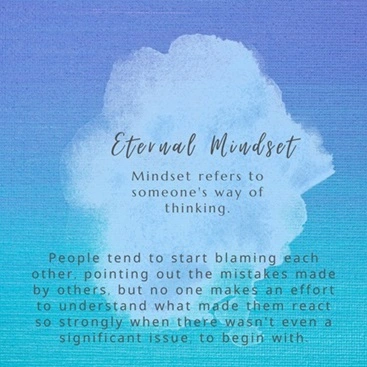This might have happened many times, where you noticed people overreacting to even small matters and escalating them to big arguments. Sometimes, it’s not just strangers, but also people whom you know or are close to you, including acquaintances which makes you wonder that it wasn’t a significant matter that happened for them to react so excessively.
It is important to ponder a thought that the things that seem correct might not be perceived as right by many others, and contrary you might not necessarily agree with their perspectives either. Don’t you think that our changing thoughts and perspectives often become the cause of numerous arguments?
Whether it’s at home or elsewhere, it’s essential to understand people’s way of thinking so as to identify the root cause and resolve the conflict peacefully. Understanding the mindset of people is one of the many essential principles of synced harmony and we will be discussing it in this article.

What is Mindset?
Mindset in simple words refers to someone’s way of thinking. How someone reacts in a particular situation has a direct relation to the way they think. If you could know in advance about someone’s attitude, it would become much easier for you to understand how they might react or could react in a particular scenario.
Let me explain this with an example: I’ve been living with my parents and siblings in my home since childhood. Today, I’m so familiar with their nature that I know their mindset very well. I can anticipate how they would react in a given situation, which allows me to manage the situation well at a personal level. At the same time, I can also gauge where the chances of the situation going out of control are higher. We refer to this as understanding someone’s mindset – knowing what they think, how their thoughts are, what influences them, and what they dislike.
If we want to understand someone’s mindset, it’s important for us to know what influences their thoughts and ideas. A person’s mentality develops throughout their upbringing, the environment in which they were raised and are currently living, their past experiences, and the people around them. Who is inspiring them with their words and who provokes them, all these factors affect their mindset.
Another factor that influences thought processes is personality. You must have observed that some people are naturally quite optimistic, while others consistently have negative thoughts. Some individuals still have a mindset rooted in the past, while others are more aligned with the trends of the present times. All of these aspects also significantly impact one’s outlook.
As an example: My wife’s attitude will likely be quite different from mine or any member of my household. This is because her upbringing occurred in her maternal home where the environment was completely different from her marital home. The traditions, beliefs, and rituals followed there were entirely different, moreover, the people she grew up with were also culturally diverse.
Four Types of Mindsets
From a general perspective, mindsets can be divided into four main types:
Fixed Mindset: People with a fixed mindset are reluctant to change their thinking. These individuals believe that what they learned during their childhood remains valid for a lifetime, and they are not open to anything that goes against it. They are not willing to change their thinking, nor do they show any interest in adopting new perspectives.
Growth Mindset: People with a growth mindset consistently change their mentality with new ways of thinking. They continuously evolve their thinking through learning, developing, and enhancing their intelligence. They have a keen interest in seeing things from a different lens, and this is what keeps altering their perspectives.
Positive Mindset: Individuals with a positive mindset consistently focus on positive aspects. They are the ones who continuously strive to see rays of hope even amidst disappointments. People with a positive outlook are pretty progressive and influential. Others are drawn to them, enjoying their company, and due to their positive mentality, they often become quite popular.
Negative Mindset: Those with a negative mindset tend to think negatively about everything. They are the individuals who consistently spread feelings of despair. These individuals can even demotivate an optimistic and motivated person, so it’s better to stay away from them as much as possible.
If I talk about my home, my mom and dad do have a fixed mindset, while on the other hand, my wife has a growth mindset. On the other hand, I’m a positive mindset person who believes that no matter how many arguments might arise between them, I can peacefully keep both of them under one roof, seems funny, doesn’t it? There are indeed many people in my life with a negative mentality, but I don’t want to mention them as it’s better to stay away from them as far as possible.
Why is Understanding Mindset Important
As I mentioned, understanding someone’s mindset allows us to get an idea of how they might react to a particular situation. Often, when a conflict arises, people tend to start blaming each other, pointing out the mistakes made by the other person, but no one will make an effort to understand why the other person reacted so strongly when there wasn’t even a significant issue, to begin with.
Understanding the mindset of others is important because:-
- Eliminate biases: When you understand the mindset of people involved in a conflict, you don’t remain biased towards one side because you are familiar with the fact that during a conflict, both parties have their own way of thinking. Accordingly, you contemplate resolving the issue based on what both sides were thinking at that time.
- Helps in formulating an approach for resolution: You get an idea of what you should talk about so that the other person listens to you, and you can anticipate how they might react to it.
- It helps you convince others and clear misunderstandings: You can help people understand what could be the mindset of the other person at the time when the situation happened and may be able to support the justification of their reaction at that time.
- Helps identify the root cause: Another significant aspect is that by understanding the mindset, you can uncover the root cause of the problem. You can comprehend who might have perceived what, leading to the initiation of the conflict.
- Uncover valid Arguments: By understanding other mindsets, you might grasp that their perspective holds valid arguments too, which cannot be dismissed. Continuously bringing up the same topic with them might function as triggering points, as you realize their sensitivity towards it.
- Stop making any assumptions yourself: You will act based on what you have heard from others and not based on your own assumptions.
- Build trust and rapport: When you patiently listen to someone, you earn their trust, and they also become comfortable speaking openly with you. This allows you to gain a better understanding of their mindset.
Change your mindset, change the game | Dr. Alia Crum | TEDxTraverseCity
How can you understand someone’s mindset?
Listen patiently: To understand someone’s mindset, it’s most important to listen to them patiently. If you carefully listen to what they’re saying and refrain from asking too many questions, it’s possible that the other person will start getting comfortable and talk to you more openly.
- Understand their thoughts: You’ll also need to understand how their thoughts and perspectives work, and what opinions they hold on different topics. Do they embrace new ideas easily, or do they resist adopting them? Is there a positive aspect to their thinking, or do they tend to interpret everything negatively?
- Analyze their surrounding environment: You will gradually need to analyze their surrounding environment as well – the culture they were raised in and the mindset prevalent among the people there. You’ll need to understand what they were taught since childhood, what they still adhere to, and which beliefs they find contradictory to their core values.
Don’t Judge: Lastly, don’t judge someone based on their mindset, whether it’s right or wrong, your response should remain entirely neutral while listening to them. You’re not here to make judgments about what’s correct or incorrect, but rather to understand their perspective and viewpoint.
Conclusion
Understanding the mindset of others is crucial for achieving synced harmony which can help bring peace and harmony in relationships. Having an idea of an individual’s personal boundaries and tolerance limits will allow you to comprehend their triggering points and this can help you determine where things are getting escalated. Please let me know in the comment section what are your thoughts on this topic, and also share your views on how important it is to understand the mindset of others for peaceful coexistence.
FOLLOW Synched Harmony Join our vibrant community for daily inspiration. Swipe-Up to follow for more related content.

3 thoughts on “4 Easy Tips to Understand Others Mindset”